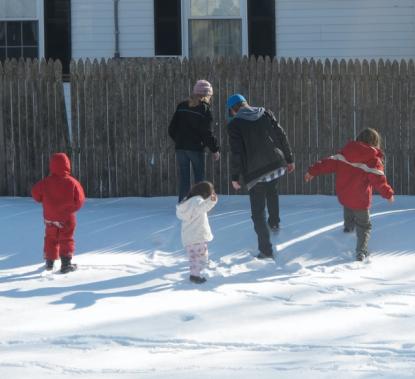
As mama to three boys and one girl, I’m kind of accustomed to having the boys outnumber the girls (for years, it was four-to-one in my immediate family). The two bigger guys and their papa are in DC for a couple of days and so it’s me plus the smaller two (one boy, one girl). Yesterday, before the kids’ friend Bayla arrived, there were under my wing four females and just one male. She upped it, five females.
The three and the four year-old girl pals spent much of their day together in pink princess dress and red sequined skirt. The ‘tween are not at all into pink. Especially the seventh graders: they are short hair, baseball caps at jaunty angles, jeans, “cool” sneaks, and plaid shirts over tees. This week, the pair went shopping together. The one we’ve known forever, and who hasn’t worn pink since preschool (I screeched when I found her in pink, in an old photograph, that unlikely), seems to have become interested in shopping over recent months. These girls have a strong sense of their own style. They told me, “We dress so much better than those the other girls.”
“Well, o-kay!” I replied. By those other girls, they mean the girlie-girl seventh graders.
**
Accepting Dad wrote a piece recently about his pink boy now also a grown tweenager, and how he—Accepting Dad—had spent earlier years worrying about his boy with the long hair, the penchant for prettiness, and the non-conformity not because he felt anything was wrong with his kid’s preferences but because he worried about others’ responses to his child. Now, Accepting Dad trusts in the child’s sense of self and his son’s ability to venture into the world as the unique person he is.
Sarah Hoffman, writing in Salon this week, pointed out that when people are certain they know her son is gay, she isn’t sure… of anything. Of “Random Mom,” Hoffman points out: “Random Mom doesn’t know who or what my son is going to grow up to be, any more than she knows who or what her kid is going to grow up to be.”
So well we know the little beings in our arms whose noses we wipe (and tears and bottoms). They are so completely themselves at three or at six. But the so-called outcome is such that regardless of what you love or how you act at three or six (I didn’t touch a vegetable; I no longer, not since high school, have touched meat) there’s more to come. That’s the truth about growing up and that’s the truth about parenting; as much as you know in one intense moment, you still can’t know how the story unfolds.
**
My eight year-old son wears long hair he refuses to pull back; he even enjoys brushing it (when he remembers to). He’s proud of his hair. I love the fact he wears his hair how he does for no other reason than it’s so him. And that he is comfortable being himself. I love his long hair because I love him (I’d love his short hair, too, no more, no less).
These days, this long/short/boy/girl hair thing is a little confusing to the four year-old according to her papa.
I asked her whether the longhaired eight year-old is a boy or a girl. She replied, “He’s a boy.”
Her papa said, “I used to have really long hair, too.”
The eight year-old added, “So did my papa.”
Conclusion: we like hair.
Then, I asked about the shorthaired ‘tweens. The four year-old is not so sure, boys or girls.
“Girls,” her papa and I reminded her.
Not that it matters to the four year-old. She loves these big kids who take her on adventures in the snow, regardless of a silly detail like gender.



